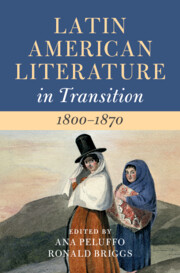Book contents
- Latin American Literature in Transition 1800–1870
- Latin American Literature in Transition
- Latin American Literature in Transition 1800–1870
- Copyright page
- Contents
- Figures
- Contributors
- Acknowledgments
- Introduction
- Part I Aesthetics of Disorder
- Part II Affective Communities
- Part III Intersectional Subjectivities
- Chapter 15 Shame, Enslavement, and Identity
- Chapter 16 Narratives from Enslavement
- Chapter 17 Masculinities and Racial Ambivalence
- Chapter 18 Childhood, Race, and Gender
- Chapter 19 Uncle Tom’s Cabin in Brazil
- Part IV Transoceanic Consciousness
- Index
- References
Chapter 16 - Narratives from Enslavement
from Part III - Intersectional Subjectivities
Published online by Cambridge University Press: 24 January 2023
- Latin American Literature in Transition 1800–1870
- Latin American Literature in Transition
- Latin American Literature in Transition 1800–1870
- Copyright page
- Contents
- Figures
- Contributors
- Acknowledgments
- Introduction
- Part I Aesthetics of Disorder
- Part II Affective Communities
- Part III Intersectional Subjectivities
- Chapter 15 Shame, Enslavement, and Identity
- Chapter 16 Narratives from Enslavement
- Chapter 17 Masculinities and Racial Ambivalence
- Chapter 18 Childhood, Race, and Gender
- Chapter 19 Uncle Tom’s Cabin in Brazil
- Part IV Transoceanic Consciousness
- Index
- References
Summary
The phrase “Caribbean studies” tends to underscore the region’s fragmentation as a fundamental point of departure. Colonization by different European powers, which fostered vertical relationships with colonies and actively discouraged horizontal connections between Caribbean islands, has persistently reduced communication, mutual knowledge, and exchange between the different linguistic subregions.
- Type
- Chapter
- Information
- Latin American Literature in Transition 1800–1870 , pp. 252 - 264Publisher: Cambridge University PressPrint publication year: 2022

